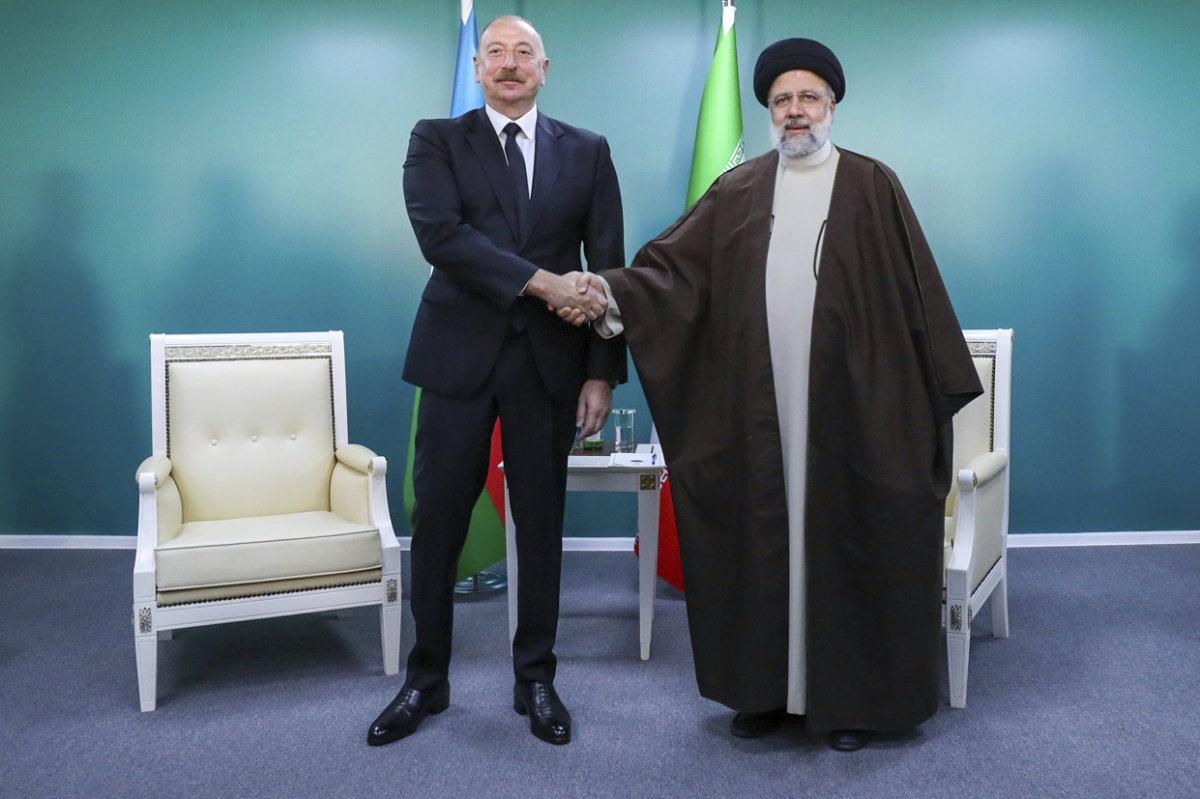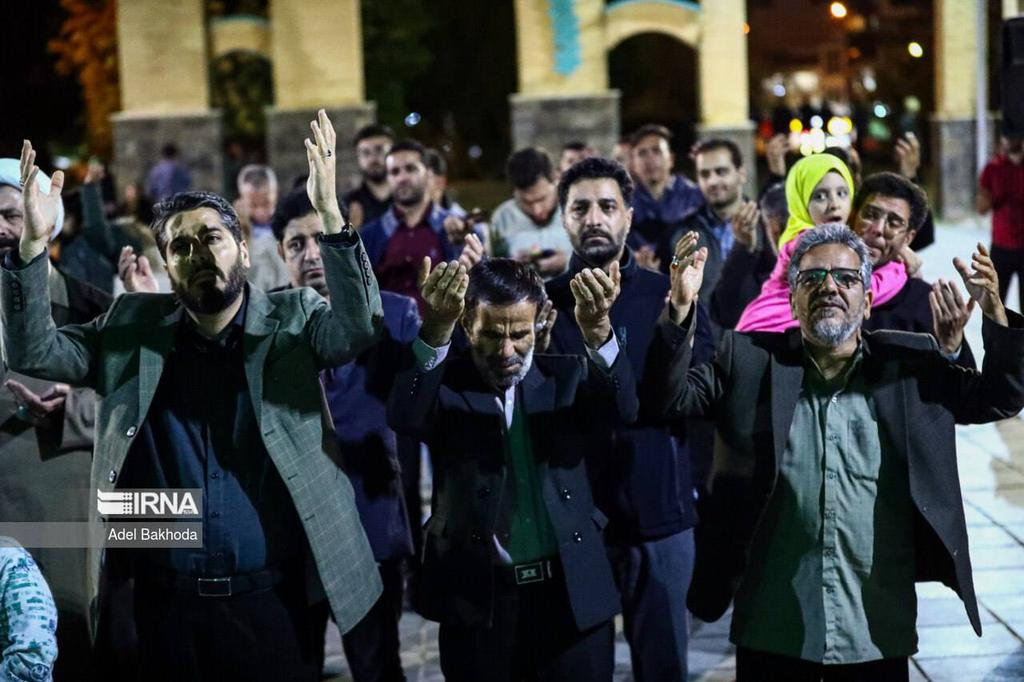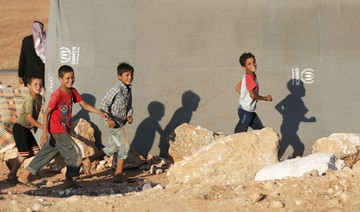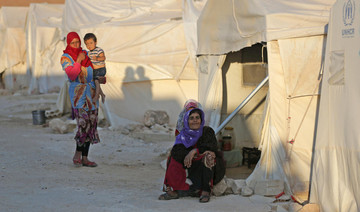BEIRUT: Targeted killings and kidnappings for ransom have for months rattled Syria’s Idlib province, with angry residents blaming dominant opposition and terrorist forces for the chaos.
Even as the regime says it aims to retake the northwestern province on Turkey’s border, its inhabitants are falling victim to infighting between the rival groups controlling most of it.
Car bombings, roadside explosives and gunfire have targeted and killed more than 200 fighters, but have also cost the lives of dozens of civilians, the Syrian Observatory for Human Rights says.
These mostly unclaimed killings, as well as increasingly frequent abductions, have left inhabitants in constant fear of being caught up in the violence.
“Every time I want to take my car somewhere, I inspect it thoroughly... to make sure there’s no explosive device planted in it,” said a media activist in southern Idlib.
“Whenever I drive by a dustbin, I accelerate, afraid it’s going to blow up,” he said, asking to remain anonymous for fear of reprisals.
At the mosque on Fridays, he sits at the front of the congregation, as far away as possible from the entrance, in case a car or motorbike blows up outside.
Since April, 270 people — including 55 civilians — have been killed in assassinations of rebels and commanders from all sides in Idlib, and adjacent parts of Hama and Aleppo provinces, the Britain-based Observatory says.
Activists and analysts blame most of the violence on two rival umbrella groups, also attributing some to the Daesh group and alleged regime collaborators.
The Hayat Tahrir Al-Sham (HTS) alliance, which is led by terrorists from Al-Qaeda’s former Syrian affiliate, controls more than 60 percent of Idlib. Part of the rest is held by the National Liberation Front, a rival umbrella group backed by Turkey, while Daesh also has sleeper cells in the area.
The regime holds the southeastern tip of the province that is home to some 2.5 million people — more than half displaced by Syria’s seven-year war or bussed into Idlib under surrender deals.
As the rampant insecurity in opposition areas reaches all walks of life, residents have grown increasingly angry.
The media activist from southern Idlib said he mostly blamed the dominant force of HTS for the chaos.
“As the most powerful force on the ground, it is responsible for guaranteeing security,” the activist said.
Medical staff in the HTS-held provincial capital have also had enough.
In June, doctors and pharmacists in Idlib city announced a three-day strike to protest against “chaos and a lack of security,” including the kidnapping of doctors for ransom.
In one of the latest incidents, on Aug. 7, masked men abducted Khalil Agha, a hospital director in the southwest of the province, said district spokesman Mahmud Al-Sheikh.
He was only released a week later after payment of a $100,000 ransom, Sheikh said.
A second activist said that, in the street, residents changed their route if they saw men with scarves wrapped around their faces, fearing an attack.
In recent weeks, HTS as well as other combatants have arrested not only alleged Daesh members, but also dozens of people accused of collusion with the regime.
Rebels fear loyalists could help broker a surrender deal, but HTS official Khaled Al-Ali also accused regime forces of helping to foment instability.
President Bashar Assad on July 26 said regaining control of Idlib was a priority. But analysts say any offensive is likely to be limited to Idlib’s peripheries, to allow Turkey and regime ally Russia to eke out a deal for the rest of the province.
A report for the Turkey-based Omran Center for Strategic Studies said the chaos was due to “competition between a flurry of local forces,” as well as IS and regime sleeper cells.
The instability was affecting the popularity of all rebels, the report’s author Nawar Oliver told AFP, especially HTS.
“Many areas in Idlib hate HTS and are ready to revolt against them at any time,” said the analyst.
Popular anger “could help the regime if it tried to take back the province,” Oliver said.
But discontent over the violence could also “make civilians more favorable to an alternative” put forward by Ankara and Moscow, he said.
Killings, abductions feed frustration in Idlib
Killings, abductions feed frustration in Idlib

- Activists and analysts blame most of the violence on two rival umbrella groups, also attributing some to the Daesh group and alleged regime collaborators
- In June, doctors and pharmacists in Idlib city announced a three-day strike to protest against “chaos and a lack of security,” including the kidnapping of doctors for ransom
Israel intends to broaden Rafah sweep, Defense Minister Gallant tells Washington

- After weeks of public disagreements with Washington over the Rafah planning, Israel on May 6 ordered Palestinian civilians to evacuate parts of the city and began troop and tank incursions.
JERUSALEM: Israel intends to broaden its military operation in Rafah, Defense Minister Yoav Gallant on Monday told a senior aide to US President Joe Biden, who has warned against major action in the southern Gazan city that may risk mass civilian casualties.
Israel describes Rafah, which abuts the Gaza Strip’s border with the Egyptian Sinai, as the last stronghold of Hamas Islamists whose governing and combat capabilities it has been trying to dismantle during the more than seven-month-old war.
After weeks of public disagreements with Washington over the Rafah planning, Israel on May 6 ordered Palestinian civilians to evacuate parts of the city and began troop and tank incursions.
“We are committed to broadening the ground operation in Rafah to the end of dismantling Hamas and recovering the hostages,” a statement from Gallant’s office quoted him as telling visiting US National Security Adviser Jake Sullivan.
Israel believes dozens of hostages from the cross-border Hamas rampage on Oct. 7 are being held in Rafah.
Western powers and Egypt have voiced concern for the fate of hundreds of thousands of displaced Palestinians sheltering there, despite Israeli assurances about humanitarian safeguards.
The UN agency for Palestinian refugees UNRWA said on Monday that it estimated 810,000 people had fled Rafah since May 6 — potentially more than half of the city’s wartime population.
There was no immediate US comment on the Gallant talks.
The statement from Gallant’s office said he “presented to (National Security) Adviser Sullivan the provisions Israel implemented for evacuating the population from the Rafah area and for setting up the appropriate humanitarian response.”
Israel says its forces in Rafah have discovered dozens of tunnels from the Sinai, a potential embarrassment for Cairo. The Egyptian state information service has previously dismissed speculation about cross-border smuggling to Gaza as “lies.”
Ireland’s top diplomat concerned over slow pace of justice in peacekeeper’s killing in Lebanon

- Lebanon’s military tribunal last June charged four men with the killing of Pvt. Seán Rooney, 24, of Newtown Cunningham, Ireland, following a half-year probe. Rooney was killed on Dec. 14, 2022.
BEIRUT: Ireland’s top diplomat in a visit to Lebanon on Monday expressed his concern over the slow progress in criminal proceedings against several Lebanese men charged with the killing of an Irish peacekeeper in 2022 in the tiny Mediterranean country.
Micheál Martin, Irish foreign and defense minister, said he was “very, very concerned” about the case. He met with Irish peacekeepers in south Lebanon and with Lebanese Foreign Minister Abdallah Bou Habib and a representative of the Lebanese defense ministry.
Lebanon’s military tribunal last June charged four men with the killing of Pvt. Seán Rooney, 24, of Newtown Cunningham, Ireland, following a half-year probe. Rooney was killed on Dec. 14, 2022.
Only one of the suspects, Mohammed Ayyad, was arrested. However, he was released on bail in November, with officials citing his medical condition. The four others facing charges — Ali Khalifeh, Ali Salman, Hussein Salman, and Mustafa Salman — remain at large.
All five are allegedly linked with the Lebanese militant group Hezbollah. Hezbollah has repeatedly denied any role in the killing.
On the fatal night, Rooney and several other Irish soldiers from UNIFIL were on their way from their base in southern Lebanon to the Beirut airport. Two UN vehicles apparently took a detour through Al-Aqbiya, which is not part of the area under the peacekeepers’ mandate.
Initial reports said angry residents confronted the peacekeepers, but the indictment concluded that the shooting was a targeted attack. The UN peacekeeper vehicle reportedly took a wrong turn and was surrounded by vehicles and armed men as they tried to make their way back to the main road.
“We want justice to be done” and for the killers to be “brought to justice,” Martin told reporters. “We understand the separation of powers. But we are concerned at the slow pace of the trial. And the Irish people want justice”
UNIFIL was created to oversee the withdrawal of Israeli troops from southern Lebanon after Israel’s 1978 invasion, and its mission was expanded following the 2006 war between Israel and Hezbollah.
Relative calm prevailed in the border region after that war until the beginning of Israel’s war against Hamas, a Hezbollah ally, in Gaza in October. For more than seven months, Hezbollah and allied groups have clashed near-daily with Israeli forces, with no apparent immediate prospects for a halt to hostilities.
Reactions to the death of Iran’s president in a helicopter crash

- Saudi Arabia’s King Salman and Crown Prince Mohammed bin Salman offer their condolences
- Pakistan to observe a day of mourning and Pakistani flags to fly at half mast as a mark of respect
RIYADH: Saudi Arabia’s King Salman and Crown Prince Mohammed bin Salman offered their condolences to Iran the death of President Ebrahim Raisi in a helicopter crash which also killed Foreign Minister Hossein Amirabdollahian, state news agency SPA has reported.
UAE President Sheikh Mohamed bin Zayed on X said: “I extend my deepest condolences to the Iranian government and people over the passing of President Ebrahim Raisi, Foreign Minister Hossein Amir-Abdollahian, and those accompanying them following a tragic accident. We pray that God grants them eternal rest and we extend our heartfelt sympathies to their families. The UAE stands in solidarity with Iran at this difficult time.”
UAE Prime Minister and Dubai Ruler Sheikh Mohammed bin Rashid also posted on X: “Our condolences and sincere sympathies to the brotherly Iranian people and their leadership on the death of Iranian President Ebrahim Raisi and his Foreign Minister in a painful accident. Our hearts are with you in this difficult time. Our prayers are that God will cover them with His vast mercy and dwell them in His spacious Paradise.”
Iran’s Supreme Leader Ali Khamenei expressed on Monday his condolences, state media said.
Russian foreign minister Sergei Lavrov, in a statement said: “Raisi and Abdollahian were known as “true, reliable friends of our country”.
“Their role in strengthening mutually beneficial Russian-Iranian cooperation and trusting partnership is invaluable.
“We sincerely extend our condolences to the families and friends of the victims, as well as to the entire friendly people of Iran. Our thoughts and hearts are with you in this sad hour.”
Russia’s embassy in Tehran also offered condolences over Raisi’s death, state news agency TASS reported.
China’s President Xi Jinping has expressed condolences over Raisi’s death, the Chinese foreign ministry said on Monday.
Turkish President Tayyip Erdogan on Monday expressed his condolences for the death of Raisi and Amirabdollahian, saying Raisi was a “valuable colleague and brother”.
“As a colleague who personally witnessed his efforts for the peace of the Iranian people and our region during his time in power, I remember Mr. Raisi with respect and gratitude,” Erdogan said on social media platform X, adding Turkey stood by Iran in this difficult time.
Turkish foreign minister Hakan Fidan also extended condolences to the Iranian people on the death of Raisi and Amirabdollahian.
The Emir of Qatar Sheikh Tamim bin Hamad on X said: “Sincere condolences to the government and people of the Islamic Republic of Iran on the death of President Ebrahim Raisi, Foreign Minister Hossein Amir Abdullahian, and the accompanying officials in the painful helicopter accident, asking God Almighty for mercy and forgiveness for them and for their families with patience and solace. We belong to Allah and to Him we shall return.”
Egypt’s president Abdel Fattah El-Sisi on Monday extended his condolences for the deaths of Raisi and Amirabdollahian in a helicopter crash.
“Egypt mourns, with great sadness and grief” the Iranian president and Tehran’s top diplomat, “who passed away on Sunday following a painful accident,” the presidency said in a statement.
Iraqi Prime Minister Mohammed Shia Al-Sudani said in a statement: “With great sadness and sorrow, we have received the news of the death of the President of the Islamic Republic of Iran, Ebrahim Raisi, and the Minister of Foreign Affairs, Hossein Amir-Abdollahian, along with their companions, in the unfortunate plane crash in northern Iran.”
He added, “We extend our sincere condolences and sympathy to the Supreme Leader of the Islamic Republic, Mr. Ali Khamenei, and to the government and people of Iran. We express our solidarity with the brotherly Iranian people and the responsible officials in the Islamic Republic during this painful tragedy.
“We ask God to have mercy on the departed, and may He grant patience and solace to their families and loved ones.”
Syrian President Bashar Assad in a statement also offered condolences to Iran’s Supreme Leader over death of the president and the foreign minister.
Indian Prime Minister Narendra Modi said Monday he was “deeply saddened and shocked by the tragic demise” of Raisi after Iranian media reported he had died in a helicopter crash.
“My heartfelt condolences to his family and the people of Iran,” Modi posted on X, formerly Twitter. “India stands with Iran in this time of sorrow.”
Pakistani prime minister Shehbaz Sharif posted on X: “I along with the government and people of Pakistan extend our deepest condolences and sympathies to the Iranian nation on this terrible loss. May the martyred souls rest in heavenly peace. The great Iranian nation will overcome this tragedy with customary courage.
“Pakistan had the pleasure of hosting President Raisi and Foreign Minister Hossein Amir Abdollahian on a historic visit, less than a month ago. They were good friends of Pakistan. Pakistan will observe a day of mourning and the flag will fly at half mast as a mark of respect for President Raisi and his companions and in solidarity with Brotherly Iran.”
European Council president Charles Michel posted on X: “The EU expresses its sincere condolences for the death of President Raisi and Foreign Minister Abdollahian, as well as other members of their delegation and crew in a helicopter accident. Our thoughts go to the families.”
A Hamas statement conveyed Hamas’ “deepest condolences and solidarity” to Iran’s Supreme Leader Ali Khamenei, the Iranian government, and the Iranian people for “this immense loss.”
It praised the deceased Iranian leaders for supporting the Palestinian cause and resistance against Israel and expressed confidence that Iran’s “deep-rooted institutions” will enable it to overcome “the repercussions of this great loss.”
Mohammed Ali Al-Houthi, head of Yemen’s Houthi Supreme Revolutionary Committee, posted on X: “Our deepest condolences to the Iranian people, the Iranian leadership, and the families of President Raisi and the accompanying delegation on their reported martyrdom. We ask God to grant their families patience and solace. Verily we belong to Allah and to Him we shall return. The Iranian people will remain adhering to the loyal leaders of their people, by God’s will.”
Lebanon’s Hezbollah expressed condolences to Iran’s Supreme Leader Ali Khamenei for the death of President Raisi, a statement said.
Malaysian Prime Minister Anwar Ibrahim said he was “deeply saddened” by the death of Iranian President Ebrahim Raisi and other officials in a helicopter crash, noting their shared commitment to bolstering ties.
“I am deeply saddened by the tragic deaths of President Ebrahim Raisi, Foreign Minister Hossein Amir-Abdollahian and several other officials of the Islamic Republic of Iran,” he said in a statement on social media.
Iran declares five days of mourning after President Raisi’s death

- Iran’s supreme leader appoints First Vice President Mohammad Mokhber acting president
DUBAI/TEHRAN: Iran’s supreme leader Ayatollah Ali Khamenei announced on Monday five days of mourning for President Ebrahim Raisi who died in a helicopter crash.
“I announce five days of public mourning and offer my condolences to the dear people of Iran,” said Khamenei in an official statement a day after the death of Raisi and other officials in the crash in East Azerbaijan province.
Khamenei has appointed First Vice President Mohammad Mokhber acting president and has a maximum period of 50 days to hold elections following the death of Raisi, Iran’s official news agency IRNA reported.
Raisi, the country’s foreign minister Hossein Amirabdollahian and others have been found dead at the site of a helicopter crash Monday after an hourslong search through a foggy, mountainous region of the country’s northwest, state media reported. Raisi was 63.
The government cabinet has appointed Deputy Foreign Minister Ali Bagheri Kani as acting foreign minister.
Lebanon and Syria on Monday announced three days of national mourning for the Iranian president and foreign minister, who were killed in a helicopter crash overnight near the Azerbaijan border.
Iran enjoys sway in both countries, backing the Lebanese armed group Hezbollah in Lebanon and supporting Syria’s government and security forces stay in power throughout more than a decade of war.
“I can’t tell you how sorry I am about this incident that happened. Especially that the foreign minister had become a friend,” Lebanon’s Foreign Minister Abdallah Bou Habib told reporters on Monday.

The helicopter also carried the governor of Iran’s East Azerbaijan province, other officials and bodyguards, the state-run IRNA news agency reported.
Early Monday morning, Turkish authorities released what they described as drone footage showing what appeared to be a fire in the wilderness that they “suspected to be wreckage of helicopter.” The coordinates listed in the footage put the fire some 20 kilometers (12 miles) south of the Azerbaijan-Iranian border on the side of a steep mountain.

Footage released by the IRNA early Monday showed what the agency described as the crash site, across a steep valley in a green mountain range. Soldiers speaking in the local Azeri language said: “There it is, we found it.”
Condolences started pouring in from neighbors and allies after Iran confirmed there were no survivors from the crash. Pakistan announced a day of mourning and Indian Prime Minister Narendra Modi said in a post on X that his country “stands with Iran in this time of sorrow.” Leaders of Egypt and Jordan also offered condolences, as did Syrian President Bashar Assad.
Azerbaijan’s President Ilham Aliyev said he and his government were “deeply shocked” — Raisi was returning on Sunday after traveling to Iran’s border with Azerbaijan to inaugurate a dam with Aliyev when the crash happened.

Turkish President Recep Tayyip Erdogan conveyed his condolences. Russian President Vladimir Putin, in a statement released by the Kremlin, described Raisi “as a true friend of Russia.”
Khamenei, who had himself urged the public to pray Sunday night, stressed the business of Iran’s government would continue no matter what.
Under the Iranian constitution, Iran’s vice first president takes over if the president dies, with Khamenei’s assent, and a new presidential election would be called within 50 days.
First Vice President Mokhber already had begun receiving calls from officials and foreign governments in Raisi’s absence, state media reported. An emergency meeting of Iran’s Cabinet was held as state media made the announcement Monday morning. The Cabinet issued a statement afterward pledging it would follow Raisi’s path and that “with the help of God and the people, there will be no problem with management of the country.”

A hard-liner who formerly led the country’s judiciary, Raisi was viewed as a protégé of Khamenei and some analysts had suggested he could replace the 85-year-old leader after Khamenei’s death or resignation.
With Raisi’s death, the only other person so far suggested has been Mojtaba Khameini, the 55-year-old son to the supreme leader. However, some have raised concerns over the position being taken only for the third time since 1979 to a family member, particularly after the Islamic Revolution overthrew the hereditary Pahlavi monarchy of the shah.

Raisi won Iran’s 2021 presidential election, a vote that saw the lowest turnout in the Islamic Republic’s history. Raisi is sanctioned by the US in part over his involvement in the mass execution of thousands of political prisoners in 1988 at the end of the bloody Iran-Iraq war.
Under Raisi, Iran now enriches uranium at nearly weapons-grade levels and hampers international inspections. Iran has armed Russia in its war on Ukraine, as well as launched a massive drone-and-missile attack on Israel amid its war against Hamas in the Gaza Strip. It also has continued arming proxy groups in the Mideast, like Yemen’s Houthi rebels and Lebanon’s Hezbollah.
Meanwhile, mass protests in the country have raged for years. The most recent involved the 2022 death of Mahsa Amini, a woman who had been earlier detained over allegedly not wearing a hijab, or headscarf, to the liking of authorities. The monthslong security crackdown that followed the demonstrations killed more than 500 people and saw over 22,000 detained.
In March, a United Nations investigative panel found that Iran was responsible for the “physical violence” that led to Amini’s death.
Raisi is the second Iranian president to die in office. In 1981, a bomb blast killed President Mohammad Ali Rajai in the chaotic days after the country’s Islamic Revolution.




















